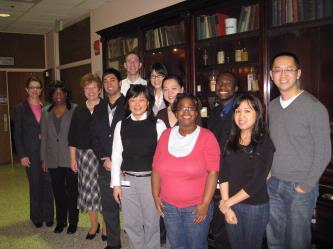Student Pharmacists Participate in Unique AMCP Competition
Competition provides opportunity to use classroom knowledge and practice population-based decision making

By Rhonda Beier
March 4, 2009
Student pharmacists at the University of Maryland School of Pharmacy interested in the field of managed care recently participated in a competition sponsored by the Academy of Managed Care Pharmacy (AMCP) that provided an opportunity to hone their research, writing and presentation skills – and that may earn one group of students a trip to the academy’s national conference in Florida in April.
Each year, AMCP sponsors a Pharmacy & Therapeutics Competition (P&T) for students at pharmacy schools across the country. The competition is designed to test the students’ ability to evaluate scientific evidence, conduct cost/benefit analysis, relate drug therapy choices to practice guidelines, and present a compelling argument for or against the adding of a medication to the list of those covered by a specific managed care organization. Participating students are able to utilize what they have learned in the classroom, as well as expand upon their studies by practicing population-based decision making, creating clinical budgets, and evaluating cost effectiveness.
This year, sixteen students from the School of Pharmacy, including a few in the first semester of their first year, competed in teams of four to submit written and oral arguments for or against the approval of the drug Tysabri® (natalizumab), used to treat relapsing cases of multiple sclerosis. A committee of five faculty members including Robert Beardsley, PhD, Cynthia Boyle, PharmD, Thomas Dowling, PharmD, PhD, Charmaine Rochester, PharmD, AMCP student chapter advisor Fadia Shaya, PhD, and her post doctoral fellow Paige Lin, volunteered to work extensively with students throughout the process and decide the winning team.
This year’s winning team included Raymond Bleu-Laine, a fourth year student; chapter president and third year student Ashley Burns; William Albanese, a second year student; and Brian Ellsworth, a third year student. This team has submitted their proposal to compete at the national AMCP conference.
“Although winning is not the most important objective for students, the School of Pharmacy has had great success in the national competition during the past four years, including placing first in 2006 and 2007,” says Shaya, an associate professor of pharmaceutical health services research.
Shaya describes the P&T competition as an excellent real world application of what students learn in the curriculum. “The competition poses a unique opportunity for student pharmacists to develop professional skills while working with data from evidence-based practice, and articulate the product clinical and economic value to managed care decision-makers.”
“This competition is a great opportunity for students to learn how drugs are approved for managed care formularies and what information has to be considered in the decision-making process,” says third year student Ashley Bivins. “It’s also a great way to practice time management because we needed to allot sufficient time to conduct outside research as well as thoroughly going through each product’s monograph. Overall, this experience showed me where I need more practice and skill in analyzing both clinical and economic information related to medications.”
“Often in our pharmacy curriculum we are faced with health care decisions, but these decisions are focused on the individual. Participating in the School of Pharmacy’s P&T competition gave all the participants the opportunity to make population-based health care decisions by making drug formulary decisions,” says Ashley Burns, a member of the winning team. “In the near future, our aging population will increase the burden on our already inadequate health care system and further weaken access to clinicians and resources. Therefore, it will be critical to have professionals who are confident and competent in their ability to assess clinical, humanistic and economic data in order to determine the overall value a product or service may possess and use resources efficiently. I feel that of all the opportunities I have in pharmacy school, this was by the far the most difficult and worthwhile.”
